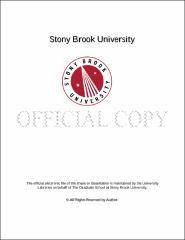| dc.identifier.uri | http://hdl.handle.net/11401/76547 | |
| dc.description.sponsorship | This work is sponsored by the Stony Brook University Graduate School in compliance with the requirements for completion of degree. | en_US |
| dc.format | Monograph | |
| dc.format.medium | Electronic Resource | en_US |
| dc.language.iso | en_US | |
| dc.publisher | The Graduate School, Stony Brook University: Stony Brook, NY. | |
| dc.type | Dissertation | |
| dcterms.abstract | Adenoviruses (Ad) are ubiquitous pathogens that infect a wide range of vertebrates and have been recognized in recent years as significant pathogens in immunocompromised patients. Interferons (IFNs) are cytokines that have pleiotropic effects and play important roles in innate and adaptive immunity. IFNs have broad antiviral properties and function by different mechanisms. IFNs fail to inhibit wild-type Ad replication in established cancer cell lines. In this study, I analyzed the effects of IFNs on Ad replication in normal human cells. The results demonstrated that both IFNα and IFNγ blocked wild-type Ad5 replication in primary human bronchial epithelial cells (NHBEC) and TERT-immortalized normal human diploid fibroblasts (HDF-TERT). IFNs inhibited the replication of divergent adenoviruses. The inhibition of Ad5 replication by IFNα and IFNγ is the consequence of repression of transcription of the E1A immediate early gene product. Both IFNα and IFNγ impede the association of the transactivator GABP with the E1A enhancer region during the early phase of infection. The repression of E1A expression by IFNs requires a conserved E2F binding site in the E1A enhancer, and IFNs increased the enrichment of the E2F-associated pocket proteins, Rb and p107, at the E1A enhancer in vivo. PD0332991 (Pabociclib), a specific CDK4/6 inhibitor, dephosphorylates pocket proteins to promote their interaction with E2Fs and inhibited wild-type Ad5 replication dependent on the conserved E2F binding site. Consistent with this result, expression of the small E1A oncoprotein, which abrogates E2F/pocket protein interactions, restored Ad replication in the presence of IFNα or IFNγ. Ads establish latent infections in T lymphocytes in tonsil and adenoid tissues yet the molecular mechanisms by which Ads establish and maintain the latent state are completely unknown. Here, I established a persistent Ad infection model in vitro and demonstrated that IFNγ suppresses productive Ad replication in a manner dependent on the E2F binding site in the E1A enhancer. These results reveal a novel mechanism by which adenoviruses utilize IFN signaling to suppress lytic virus replication and promote persistent infection | |
| dcterms.abstract | Adenoviruses (Ad) are ubiquitous pathogens that infect a wide range of vertebrates and have been recognized in recent years as significant pathogens in immunocompromised patients. Interferons (IFNs) are cytokines that have pleiotropic effects and play important roles in innate and adaptive immunity. IFNs have broad antiviral properties and function by different mechanisms. IFNs fail to inhibit wild-type Ad replication in established cancer cell lines. In this study, I analyzed the effects of IFNs on Ad replication in normal human cells. The results demonstrated that both IFNα and IFNγ blocked wild-type Ad5 replication in primary human bronchial epithelial cells (NHBEC) and TERT-immortalized normal human diploid fibroblasts (HDF-TERT). IFNs inhibited the replication of divergent adenoviruses. The inhibition of Ad5 replication by IFNα and IFNγ is the consequence of repression of transcription of the E1A immediate early gene product. Both IFNα and IFNγ impede the association of the transactivator GABP with the E1A enhancer region during the early phase of infection. The repression of E1A expression by IFNs requires a conserved E2F binding site in the E1A enhancer, and IFNs increased the enrichment of the E2F-associated pocket proteins, Rb and p107, at the E1A enhancer in vivo. PD0332991 (Pabociclib), a specific CDK4/6 inhibitor, dephosphorylates pocket proteins to promote their interaction with E2Fs and inhibited wild-type Ad5 replication dependent on the conserved E2F binding site. Consistent with this result, expression of the small E1A oncoprotein, which abrogates E2F/pocket protein interactions, restored Ad replication in the presence of IFNα or IFNγ. Ads establish latent infections in T lymphocytes in tonsil and adenoid tissues yet the molecular mechanisms by which Ads establish and maintain the latent state are completely unknown. Here, I established a persistent Ad infection model in vitro and demonstrated that IFNγ suppresses productive Ad replication in a manner dependent on the E2F binding site in the E1A enhancer. These results reveal a novel mechanism by which adenoviruses utilize IFN signaling to suppress lytic virus replication and promote persistent infection | |
| dcterms.available | 2017-09-20T16:50:36Z | |
| dcterms.contributor | Hearing, Patrick | en_US |
| dcterms.contributor | Krug, Laurie | en_US |
| dcterms.contributor | Reich, Nancy | en_US |
| dcterms.contributor | Hayman, Michael | en_US |
| dcterms.contributor | Luk, Ed. | en_US |
| dcterms.creator | ZHENG, YUETING | |
| dcterms.dateAccepted | 2017-09-20T16:50:36Z | |
| dcterms.dateSubmitted | 2017-09-20T16:50:36Z | |
| dcterms.description | Department of Molecular Genetics and Microbiology. | en_US |
| dcterms.extent | 146 pg. | en_US |
| dcterms.format | Application/PDF | en_US |
| dcterms.format | Monograph | |
| dcterms.identifier | http://hdl.handle.net/11401/76547 | |
| dcterms.issued | 2015-12-01 | |
| dcterms.language | en_US | |
| dcterms.provenance | Made available in DSpace on 2017-09-20T16:50:36Z (GMT). No. of bitstreams: 1
ZHENG_grad.sunysb_0771E_12620.pdf: 7963568 bytes, checksum: b7a696b9ed4a409b544aa4b76ecc38bf (MD5)
Previous issue date: 1 | en |
| dcterms.publisher | The Graduate School, Stony Brook University: Stony Brook, NY. | |
| dcterms.subject | Microbiology | |
| dcterms.subject | Adenovirus, E2F, Interferon, Persistent Infection, Rb | |
| dcterms.title | Exploring the Role of Interferons in Adenovirus Replication and Establishment of Persistent Infection in Normal Human Cells | |
| dcterms.type | Dissertation | |

